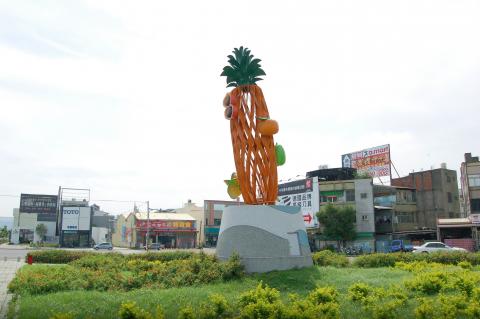Residents of Changhua County’s Yuanlin Township (員林) are not happy with a statue portraying various fruit that was erected at the intersection of Jhongshan and Jyukuang roads in the city, saying that it did not resemble the fruit it was supposed to.
The 7m tall statue — meant to represent a pineapple, a starfruit, a honey orange, a guava and a Chinese chestnut — is made of stainless steel and steel plates, and marks the entrance to a rezoned area that spans more than 184 hectares.
However, since its installation in March, residents in the township have complained that the “pineapple” was too thin and long, looking more like a carrot, and that it was too slanted and looked like it might topple over.

Photo: Tang Shih-ming, Taipei Times
There has also been criticism of how the two Chinese chestnuts attached to the pineapple made it look like the pineapple had eyes.
The guava part of the statue also came under criticism, with residents debating whether it looked more like a guava or a sweet jujube.
Township representative Chen Chiu-jung (陳秋蓉) said that aside from the starfruit and the honey orange appearing relatively normal, the other fruits in the statue were “ugly.”
Chen said she did not understand why the statue included a pineapple, because the township does not produce pineapples and added that it demonstrated ignorance of the township’s agricultural produce.
Changhua County Councilor Chen Su-yueh (陳素月) also criticized the statue, calling it “crude and ill-made” and a disgrace to all Yuanlin residents, adding a call for the county government to remove the statue and remake it.
Meanwhile, Yuanlin Township Secretary-General Lai Chih-fu (賴致富) said that while the inclusion of the pineapple might seem inappropriate, it was possible that the designer of the statue wanted to use the fruit to symbolize that good luck will come.
The word for pineapples in Hoklo (commonly known as Taiwanese) is ong lai, and is usually rendered into Mandarin with the characters wang lai (旺來) instead of fong li (鳳梨) because the word ong in Hoklo can also mean “prosperity.”
Lai also said that the township had told the county government earlier that several residents found parts of the statue to be “unlike the original fruit they were supposed to resemble.”
Changhua County Government Department of Land Director Wang Yin-ho (王銀和) said that the statue was a gift from the companies participating in the rezoning and cost about NT$5 million (US$173,000) to make.
The government had told the companies how the residents felt about the statue, and asked them to take those feelings into consideration and remove the statue, Wang said.
However, the artist who designed the statue insisted it was a work of art, Wang added.
Wang said the government respected the artist’s opinion, but took residents’ complaints seriously, and that the county government would continue to negotiate an acceptable resolution with the companies that commissioned the statue.

An essay competition jointly organized by a local writing society and a publisher affiliated with the Chinese Communist Party (CCP) might have contravened the Act Governing Relations Between the People of the Taiwan Area and the Mainland Area (臺灣地區與大陸地區人民關係條例), the Mainland Affairs Council (MAC) said on Thursday. “In this case, the partner organization is clearly an agency under the CCP’s Fujian Provincial Committee,” MAC Deputy Minister and spokesperson Liang Wen-chieh (梁文傑) said at a news briefing in Taipei. “It also involves bringing Taiwanese students to China with all-expenses-paid arrangements to attend award ceremonies and camps,” Liang said. Those two “characteristics” are typically sufficient

The brilliant blue waters, thick foliage and bucolic atmosphere on this seemingly idyllic archipelago deep in the Pacific Ocean belie the key role it now plays in a titanic geopolitical struggle. Palau is again on the front line as China, and the US and its allies prepare their forces in an intensifying contest for control over the Asia-Pacific region. The democratic nation of just 17,000 people hosts US-controlled airstrips and soon-to-be-completed radar installations that the US military describes as “critical” to monitoring vast swathes of water and airspace. It is also a key piece of the second island chain, a string of

A magnitude 5.9 earthquake that struck about 33km off the coast of Hualien City was the "main shock" in a series of quakes in the area, with aftershocks expected over the next three days, the Central Weather Administration (CWA) said yesterday. Prior to the magnitude 5.9 quake shaking most of Taiwan at 6:53pm yesterday, six other earthquakes stronger than a magnitude of 4, starting with a magnitude 5.5 quake at 6:09pm, occurred in the area. CWA Seismological Center Director Wu Chien-fu (吳健富) confirmed that the quakes were all part of the same series and that the magnitude 5.5 temblor was

The Central Weather Administration has issued a heat alert for southeastern Taiwan, warning of temperatures as high as 36°C today, while alerting some coastal areas of strong winds later in the day. Kaohsiung’s Neimen District (內門) and Pingtung County’s Neipu Township (內埔) are under an orange heat alert, which warns of temperatures as high as 36°C for three consecutive days, the CWA said, citing southwest winds. The heat would also extend to Tainan’s Nansi (楠西) and Yujing (玉井) districts, as well as Pingtung’s Gaoshu (高樹), Yanpu (鹽埔) and Majia (瑪家) townships, it said, forecasting highs of up to 36°C in those areas